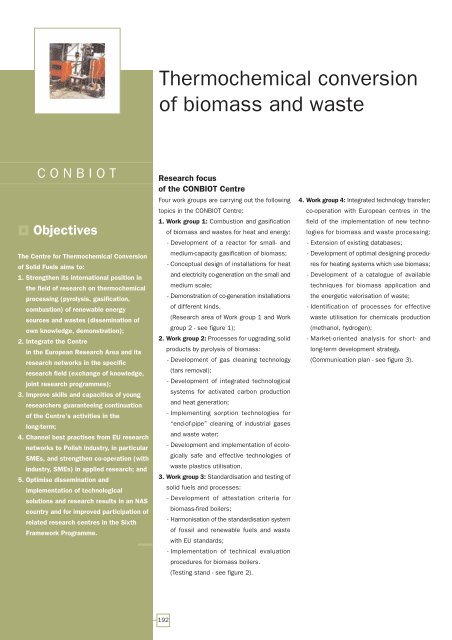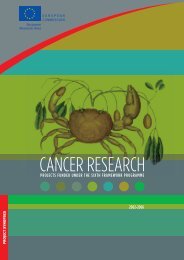European Bio-Energy Projects
European Bio-Energy Projects
European Bio-Energy Projects
You also want an ePaper? Increase the reach of your titles
YUMPU automatically turns print PDFs into web optimized ePapers that Google loves.
CONBIOT<br />
Objectives<br />
The Centre for Thermochemical Conversion<br />
of Solid Fuels aims to:<br />
1. Strengthen its international position in<br />
the field of research on thermochemical<br />
processing (pyrolysis, gasification,<br />
combustion) of renewable energy<br />
sources and wastes (dissemination of<br />
own knowledge, demonstration);<br />
2. Integrate the Centre<br />
in the <strong>European</strong> Research Area and its<br />
research networks in the specific<br />
research field (exchange of knowledge,<br />
joint research programmes);<br />
3. Improve skills and capacities of young<br />
researchers guaranteeing continuation<br />
of the Centre’s activities in the<br />
long-term;<br />
4. Channel best practises from EU research<br />
networks to Polish industry, in particular<br />
SMEs, and strengthen co-operation (with<br />
industry, SMEs) in applied research; and<br />
5. Optimise dissemination and<br />
implementation of technological<br />
solutions and research results in an NAS<br />
country and for improved participation of<br />
related research centres in the Sixth<br />
Framework Programme.<br />
Thermochemical conversion<br />
of biomass and waste<br />
Research focus<br />
of the CONBIOT Centre<br />
Four work groups are carrying out the following<br />
topics in the CONBIOT Centre:<br />
1. Work group 1: Combustion and gasification<br />
of biomass and wastes for heat and energy:<br />
- Development of a reactor for small- and<br />
medium-capacity gasification of biomass;<br />
- Conceptual design of installations for heat<br />
and electricity co-generation on the small and<br />
medium scale;<br />
- Demonstration of co-generation installations<br />
of different kinds.<br />
(Research area of Work group 1 and Work<br />
group 2 - see figure 1);<br />
2. Work group 2: Processes for upgrading solid<br />
products by pyrolysis of biomass:<br />
- Development of gas cleaning technology<br />
(tars removal);<br />
- Development of integrated technological<br />
systems for activated carbon production<br />
and heat generation;<br />
- Implementing sorption technologies for<br />
“end-of-pipe” cleaning of industrial gases<br />
and waste water;<br />
- Development and implementation of ecologically<br />
safe and effective technologies of<br />
waste plastics utilisation.<br />
3. Work group 3: Standardisation and testing of<br />
solid fuels and processes:<br />
- Development of attestation criteria for<br />
biomass-fired boilers;<br />
- Harmonisation of the standardisation system<br />
of fossil and renewable fuels and waste<br />
with EU standards;<br />
- Implementation of technical evaluation<br />
procedures for biomass boilers.<br />
(Testing stand - see figure 2).<br />
192<br />
4. Work group 4: Integrated technology transfer;<br />
co-operation with <strong>European</strong> centres in the<br />
field of the implementation of new technologies<br />
for biomass and waste processing:<br />
- Extension of existing databases;<br />
- Development of optimal designing procedures<br />
for heating systems which use biomass;<br />
- Development of a catalogue of available<br />
techniques for biomass application and<br />
the energetic valorisation of waste;<br />
- Identification of processes for effective<br />
waste utilisation for chemicals production<br />
(methanol, hydrogen);<br />
- Market-oriented analysis for short- and<br />
long-term development strategy.<br />
(Communication plan - see figure 3).

















